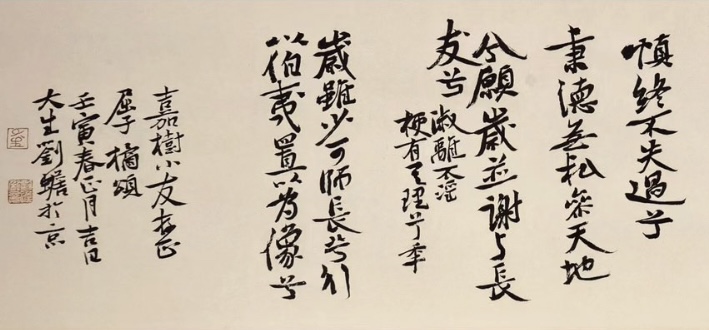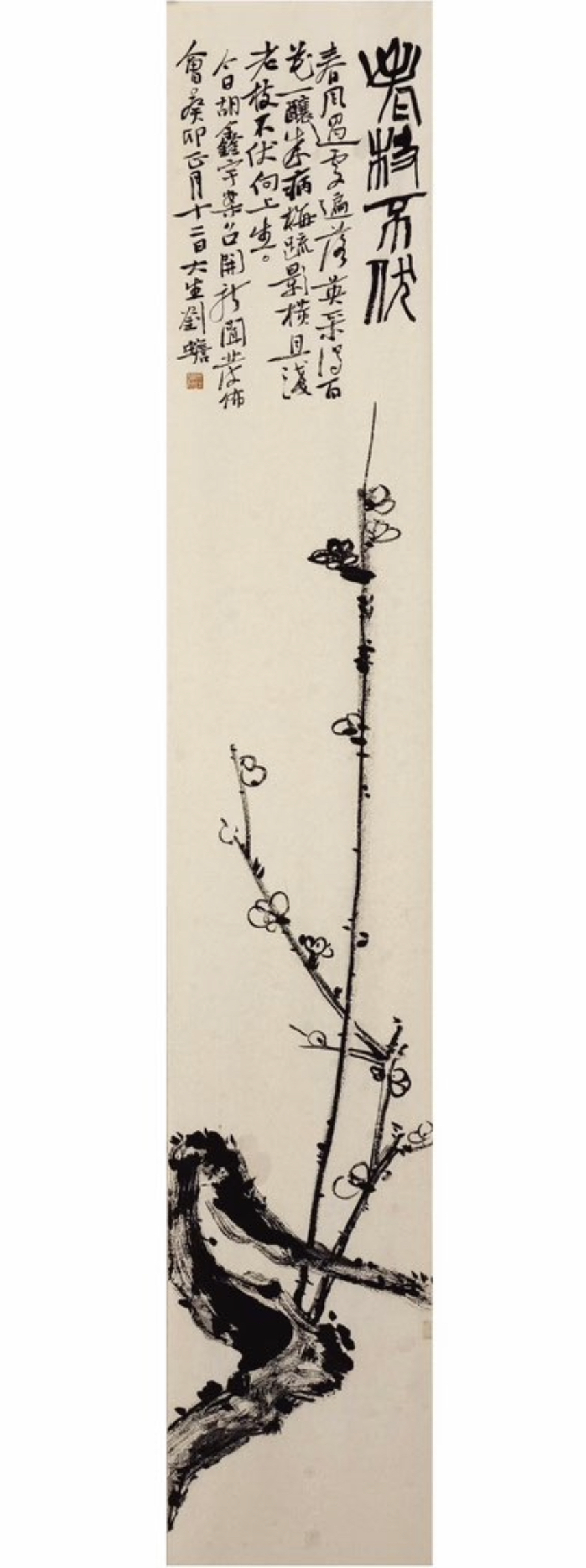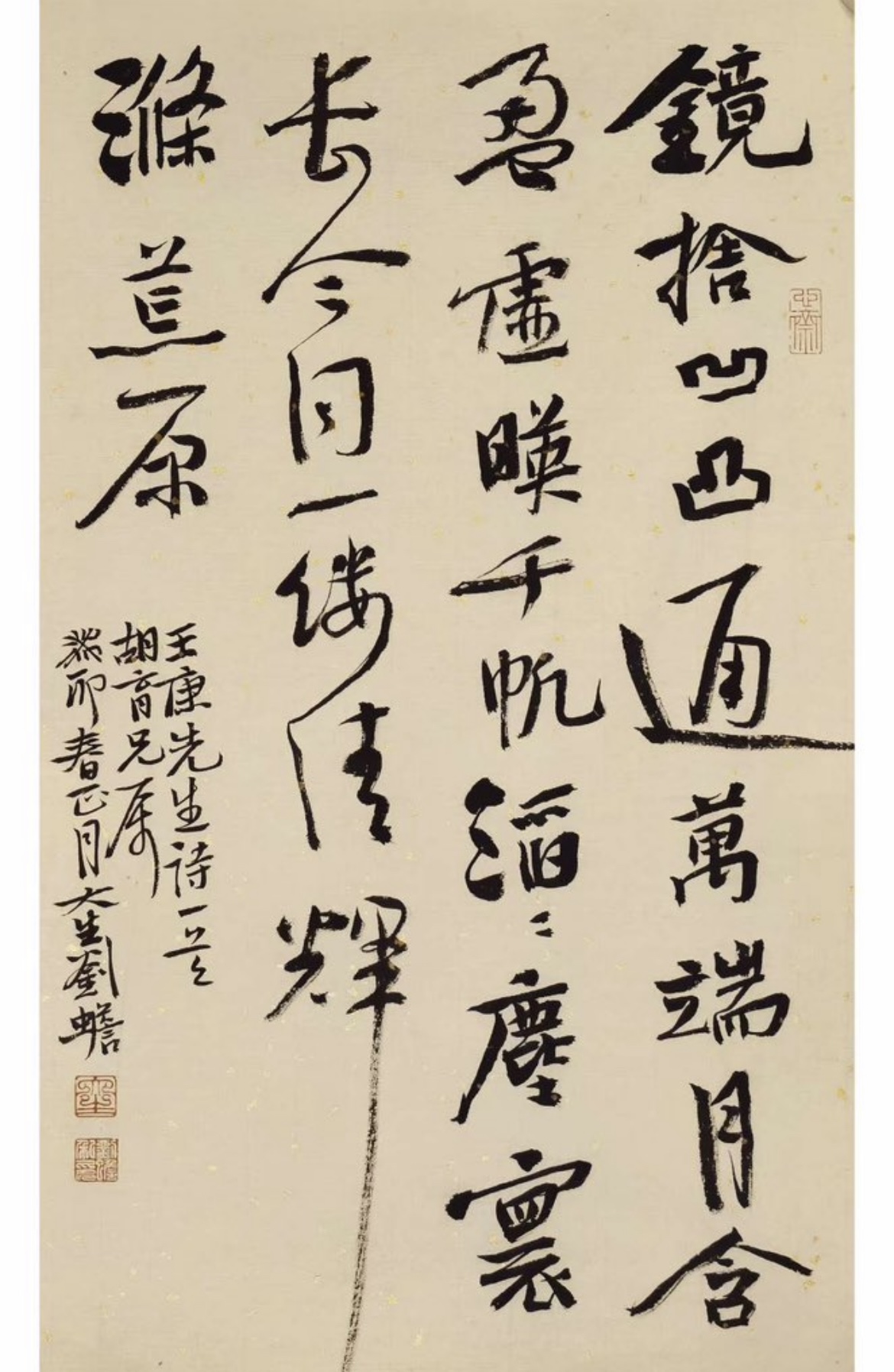The Other China
詩言志
In early February 2023, the calligrapher and cultural commentator Liu Chan 劉蟾, whose work features in The Other China, republished a handwritten version of ‘The Orange Tree’ 橘頌 jú sòng, one of the Nine Pieces 九章 jiǔ zhāng in Songs of the South 楚辭 Chǔ cí, an ancient collection of poems attributed to Qu Yuan 屈原.
Originally written in February 2022, Liu Chan’s calligraphic interpretation of Qu Yuan is reproduced here to reflect the temper of the times. The poem employs a common literary device to ‘express sentiment through an object’, 托物言志 tuō wù yán zhì. As David Hawkes, whose translation of Songs of the South is essential reading for anyone interested in Chinese poetry, says of this particular work that:
The ‘orange-tree’ of this poem is the citrus nobilis, which was traditionally supposed not to grow naturally anywhere north of the River Yangtze. It is this ‘steadfastness’ which seems to have recommended it to the poet for comparison with the virtuous young man to whom this poem appears to be addressed. We can only guess whether this is a graceful tribute from an older to a younger poet or, as some have suggested, a poet’s tribute to a young prince of whom great things are expected. Some modern Chinese scholars have classified it as an ‘early work’ of Qu Yuan. The fact that it is written throughout in ‘7-plus’ metre makes this extremely unlikely; but what one believes about its authorship does not seem to me to affect in any way one’s enjoyment of this charming poem.
— David Hawkes, The Songs of the South: An Anthology of Ancient Chinese Poems by Qu Yuan and Other Poets, Penguin Classics, 1985, p.178
We pair ‘The Orange Tree’ with a painting by Liu Chan in which he offers a comment on a controversial official press conference regarding the death of Hu Xinyu 胡鑫宇, a teenager who went missing in October 2022.
The title of the painting — 老枝不伏 lǎo zhī bù fú — is a tongue-in-cheek reference to《一枝花·不伏老》yī zhī huā · bù fú lǎo, ‘Witherless Flower’ (literally, ‘A stem that refuses to accept aging’), by the Yuan-dynasty dramatist Guan Hanqing 關漢卿, as well as being a homophone for the colloquial expression 老子不服 lǎozi bù fú: ‘I don’t accept it’, or ‘I will not submit’. Like ‘The Orange Tree’, Guan Hanqing’s ‘Refusing to Accept My Age’ is about being tenacious and unyielding.
We conclude with a poem by Wang Kang 王康 in the calligraphic hand of Liu Chan, published online on 8 February 2023. As the ancients put it: 詩言志 shī yán zhì, ‘poetry gives expression to character’.
— Geremie R. Barmé,
Editor, China Heritage
8 February 2023
***
Further Reading in Xi Jinping’s Empire of Tedium:
- Appendix XI 屈 — The Double Fifth Festival and the 35th of May 2022, 3 June 2022
Also by Liu Chan:
- 吃人、愚民和鄉愿:傳統文化的另外10張面孔,Matters,2023年1月28日
- Liu Chan’s Memorial for the Departed, 12 January 2023
- On Rumours & Lies — Dasheng’s Little Lectures, 16 January 2023
- Brainwashing vs. Educating — Dasheng’s Little Lectures, 17 January 2023
- Resisting Cultural Capture — Dasheng’s Little Lectures, 18 January 2023
- In the Eyes of the Beholder — Dasheng’s Little Lectures, 19 January 2023
The Orange Tree
橘頌
Qu Yuan 屈原
Calligraphy by Liu Chan 劉蟾
Translated by David Hawkes

***

***
Fairest of all God’s trees, the orange came and settled here,
Commanded by him not to move, but only grow in the South Country.
Deep-rooted, firm and hard to shift: showing in this its singleness of purpose;
Its leaves of green and pure white blossoms delight the eye of the beholder,
And the thick branches and spines so sharp, and the fine round fruits,
Green ones with yellow intermingling to make a pattern of gleaming brightness,
Pure white beneath the rich-hued surface: a parable of virtuous living;
Its lusty growth to the gardener’s art respondent, producing beauty without blemish.Oh, your young resolution has something different from the rest!
Alone and unmoving you stand: how can one not admire you?
Deep-rooted, hard to shift: truly you have no peer!
Alert to this world’s ways you hold your ground, unyielding against the vulgar tide.
You have sealed your heart; you guard yourself with care; have never fallen into error;
Holding a nature free from bias, impartial even as Heaven and Earth are.
I would fade as you fade with the passing years and ever be your friend.
Pure and apart and free from sin, and strong in the order of your ways:
Though young in years, fit to be a teacher of men;
In your acts like Bo Yi: I set you up as my model.
— from David Hawkes, The Songs of the South, p.178-179
[Note: For more on Bo Yi 伯夷, see Sima Qian, ‘On Bo Yi’ in A New Sinology Reader.]
***
橘頌
後皇嘉樹,橘徠服兮。受命不遷,生南國兮。
深固難徙,更一志兮。綠葉素榮,紛其可喜兮。
曾枝剡棘,圓果摶兮。青黃雜糅,文章爛兮。
精色內白,類任道兮。紛縕宜脩,姱而不醜兮。
嗟爾幼志,有以異兮。獨立不遷,豈不可喜兮。
深固難徙,廓其無求兮。蘇世獨立,橫而不流兮。
閉心自慎,終不失過兮。秉德無私,參天地兮。
願歲並謝,與長友兮。淑離不淫,梗其有理兮。
年歲雖少,可師長兮。行比伯夷,置以為像兮。
A Branch That Will Not Give In
老枝不伏

A Poem by Wang Kang in the Hand of Liu Chan
劉蟾書王康詩


